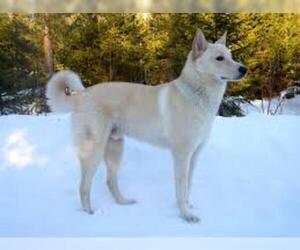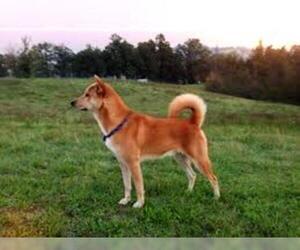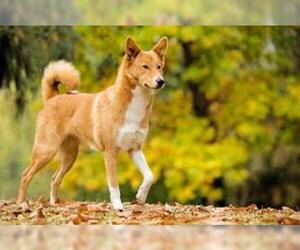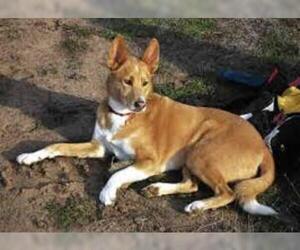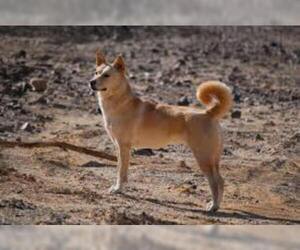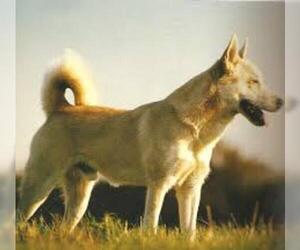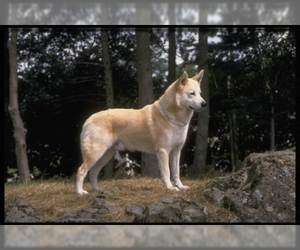
All about Canaan Dog dog breed
A.K.A. :Kelef K'naani, Israeli Canaan Dog, Palestinian Pariah Dog, Bedouin Sheepdog, Canaan, Canann, Kelef, Knaani, Canann Dog, Israeli Dog, Palestinian Dog
Size
Grooming requirements
Exercise requirements
Good with other dogs
Watchdog ability
Energetic
Training requirements
Playful
Affectionate
Good with other pets
Good with children
Good with strangers
Winter
Summer
Healthiness
Protective
Life Span
| Pure Breeds | Member |
| Breeds A - Z | C |
| Breeds by Group | Herding Sighthound & Pariah |
| Breeds by Trait | High Stamina Dog Breeds Smartest Dog Breeds |
| Overview: | The Canaan Dog is an ancient and captivating breed, originating in the Middle East where they served as herders, protectors, and companions to Bedouin tribes for millennia. Physically, they are a medium-sized dog, typically ranging from 19-24 inches tall and weighing between 35-55 pounds, boasting a distinctive double coat that comes in a variety of colors and patterns, often with white markings. Their alert expression and pricked ears give them a foxy appearance. Temperamentally, Canaan Dogs are known for their intelligence, independence, and strong protective instincts, making them excellent watchdogs. While devoted to their families, they can be reserved with strangers and benefit from early socialization. They are generally adaptable but thrive with a moderate amount of exercise and mental stimulation. With proper training and consistent leadership, they can be wonderful family companions, though their independence might make them less ideal for first-time dog owners or very small apartments without sufficient outdoor access. Health-wise, they are generally robust, but some lines may be prone to hip and elbow dysplasia or patellar luxation, so responsible breeding is crucial. |
F.A.Q.
All You Need to Know About the Canaan Dog Breed
The Canaan Dog, Israel’s national breed, is a medium-sized ancient pariah dog originating from the Middle East. Known for their alert, intelligent, and independent temperament, they make devoted companions for experienced owners. Physically, they boast a wedge-shaped head, erect ears, and a bushy tail, covered by a dense, weather-resistant double coat that comes in various colors, often with a mask. While adaptable, their natural protective instincts and moderate exercise needs mean they thrive in homes with a yard rather than small apartments, though they can adjust with sufficient mental and physical stimulation. They can be good with respectful children and other pets if socialized early. Grooming is relatively low-maintenance, requiring weekly brushing. Health-wise, they are generally robust, but like all breeds, can be prone to hip and elbow dysplasia and thyroid issues. The Canaan Dog is a unique and rewarding breed for those seeking an intelligent, loyal, and watchful canine.The average weight for a Canaan Dog is between 45 and 55 pounds.Typically, adult male Canaan Dogs weigh 50-55 pounds, while adult female Canaan Dogs are slightly lighter, ranging from 45-50 pounds. This healthy weight for a Canaan Dog ensures they maintain their athletic build and active lifestyle.
How tall is a Canaan Dog? What's the average height?
When considering a Canaan Dog height, you’re looking at a medium-sized breed with an athletic build. The average size of an adult Canaan Dog, measured at the shoulder, typically falls between 19 to 24 inches.Here’s a breakdown of their typical adult height range:- Males: Generally, male Canaan Dogs tend to be slightly taller and more substantial, often reaching the upper end of the 20 to 24-inch range.
- Females: Female Canaan Dogs are usually a bit smaller, typically measuring between 19 to 23 inches at the shoulder.
The Canaan Dog comes in a range of striking Canaan Dog colors. AKC recognized Canaan Dog colors primarily include shades of sable, sand, gold, and red, often with or without black mask and white markings. Brindle is also an officially accepted pattern, as are black and white (either solid or piebald). While these are the standard and most common, some rare coat types or exotic Canaan Dog variations can be found, though they are not recognized by major kennel clubs like the AKC and may indicate mixed breeding. These unaccepted colors might include blue, lilac, merle, or chocolate. When considering a Canaan Dog, prioritize health and temperament, understanding that rare Canaan Dog colors outside of the recognized spectrum may not be purebred and could come with different pricing.
The Canaan Dog personality is a fascinating blend of independence and loyalty, reflecting their ancient heritage as desert survivalists. They are highly intelligent and alert, making them excellent watchdogs, though not overly aggressive.When it comes to friendliness, Canaan Dogs are typically reserved with strangers, showcasing a watchful demeanor rather than immediate effusiveness. However, once they accept you, their loyalty to their family is profound and unwavering. They form strong bonds and are devoted companions.Their sociability varies. While they thrive on being part of the family, they aren't generally "lap dogs." They appreciate their personal space and can be somewhat independent thinkers. Early and consistent socialization is crucial to help them develop into well-adjusted adults, especially with new experiences and people.Regarding adaptability to apartment living, it's generally not ideal. Canaan Dogs have a moderate to high energy level and a strong desire to patrol. They do best with a securely fenced yard where they can exercise and observe their surroundings. While they can adapt to smaller spaces with sufficient daily exercise, it's not their natural preference.With children, Canaan Dogs can be good family pets, especially if raised with them. However, their herding instincts mean they might try to "herd" active children, and due to their sensitive nature, they may not tolerate rough play well. Supervision and teaching children how to interact respectfully with the dog are essential.Their behavior with other pets can be variable. They can coexist peacefully with other dogs if properly socialized from a young age. Their natural prey drive means that small, fast-moving animals like cats or rabbits may trigger their instinct to chase, so careful introductions and supervision are necessary. Each individual dog's temperament of Canaan Dog will play a role, but generally, early exposure is key for harmonious multi-pet households.
The Canaan Dog temperament is a fascinating blend of independence and loyalty, reflecting their ancient origins. They are generally reserved with strangers, showcasing a watchful and alert nature, making them excellent natural guardians. However, once they accept someone, they are deeply devoted and affectionate companions to their families.Regarding friendliness and sociability, Canaan Dogs typically aren't overly gregarious with new people. Early and consistent socialization is crucial to help them be more comfortable in varied situations. They are highly intelligent and can be sensitive, so positive reinforcement training methods work best.Their loyalty to their family is unwavering. They thrive on being part of the pack and can be quite sensitive to their owners' moods. While adaptable, they are not typically ideal for apartment living unless their exercise and mental stimulation needs are consistently met. They enjoy having a yard and opportunities to explore.When it comes to behavior with children, Canaan Dogs can be good family pets, especially if raised with children from a young age. They are often patient and protective of "their" children, but supervision is always recommended, particularly with very young or boisterous kids, due to their natural herding instincts.With other pets, they can coexist peacefully, especially if introduced early. However, their strong prey drive, stemming from their desert heritage, means they might pursue smaller, quick-moving animals. Proper introductions and management are key.Canaan Dogs can exhibit stubbornness, a characteristic often linked to their intelligence and independent spirit. They respond best to consistent, fair training and clear boundaries. They are also quite sensitive and can become withdrawn or stressed if subjected to harsh discipline. Overall, they are a unique and rewarding breed for owners who understand and appreciate their distinctive personality traits.
Canaan Dog Care: Your Essential GuideUnderstanding Canaan Dog care is key to a happy, healthy companion. These intelligent and independent dogs require consistent, thoughtful daily maintenance.Grooming: Canaan Dogs have a relatively low-maintenance, dense double coat. Regular brushing, at least once or twice a week, is essential to remove loose hair and prevent matting, especially during seasonal shedding. Occasional baths are sufficient.Exercise: Despite their history as herding dogs, Canaan Dogs are not excessively high-energy. They are a medium-energy breed requiring moderate daily exercise. Daily walks, playtime in a secure yard, or short hikes are ideal. Avoid over-exercising young puppies to protect developing joints. This is not a "low-energy dog breed" but also not a marathon runner.Dietary Considerations: A high-quality, balanced diet appropriate for their age, activity level, and size is crucial. Monitor calorie intake to prevent obesity, a common issue in many breeds. Discuss specific dietary needs or potential food sensitivities with your veterinarian.Wrinkle and Ear Cleaning: Canaan Dogs do not typically have facial wrinkles, so wrinkle cleaning is not a concern. Their erect ears should be checked weekly for cleanliness, redness, or unusual odor, and cleaned gently with a vet-approved solution if needed to prevent ear infections.Climate Sensitivity: Canaan Dogs originated in the desert and are generally adaptable to various climates. However, due to their double coat, they can be sensitive to extreme heat and humidity. Ensure access to shade and fresh water during warmer months and avoid strenuous activity during the hottest parts of the day. They are not brachycephalic, so breathing issues due to snout length are not a characteristic concern.Common Health Concerns & Health Tips for Canaan Dog:* Skin Issues: While generally hardy, some Canaan Dogs can be prone to allergies or other skin conditions. Regular grooming helps monitor skin health.* Dental Care: Daily dental hygiene, such as brushing, or dental chews, is vital to prevent periodontal disease. Regular professional dental cleanings by your vet are also recommended.* Weight Management: Monitor your Canaan Dog’s weight closely and adjust their diet and exercise as needed to prevent obesity, which can lead to various health problems.Knowing how to care for a Canaan Dog involves understanding their unique needs for mental stimulation, proper socialization, and consistent training alongside these physical care requirements.
Canaan Dog Activity Level: How active are Canaan Dogs? The Canaan Dog strikes a unique balance, displaying a moderate to high activity level. They are known for their intelligence and alertness, which translates into a need for both physical and mental stimulation. While they can be calm and observant indoors, they thrive on daily exercise and engagement.
Canaan Dog Exercise Needs: Plan for at least 60 minutes of moderate to vigorous exercise daily. This can include brisk walks, jogging, hiking, or off-leash play in a secure area. They excel in dog sports like agility, obedience, and scent work, which tap into their natural herding and guarding instincts. Their stamina allows for longer activities once conditioned.Playtime Preferences: Canaan Dogs enjoy interactive play that challenges them. Fetch, tug-of-war, and puzzle toys are great for mental stimulation. They are often keen observers and enjoy watching their surroundings, but don't mistake this for a lack of energy; they need an outlet for their innate drive.Brachycephalic Limitations: It's crucial to note that Canaan Dogs are not brachycephalic. This means they do not have the breathing limitations associated with flat-faced breeds. They handle exercise well in various climates, though common sense precautions should always be taken in extreme heat or cold. Their strong respiratory system allows them to enjoy sustained physical activity without the risks seen in brachycephalic dogs.Energy Balance: Canaan Dogs masterfully balance short bursts of energy with long periods of rest. They can go from an intense play session to a relaxed nap in the sun. This adaptability makes them suitable for a range of households, provided their exercise needs are met.Suitability for Households: Are Canaan Dogs suitable for active families or low-energy households? Active families will find the Canaan Dog to be a fantastic companion for outdoor adventures and dog sports. However, they can also adapt to low-energy households that are committed to providing consistent daily exercise, mental challenges, and regular walks. They are not a "couch potato" breed and will become bored and potentially destructive if their energy is not channeled appropriately. Providing them with a job or consistent training helps satisfy their intelligent minds.Breed Breakdown: What Experts Say About the Canaan Dog
I'd rate the "Size" trait of the Canaan Dog breed a 5 out of 10.The Canaan Dog is a medium-sized breed. On average, they stand between 19 to 24 inches tall at the shoulder and weigh between 35 to 55 pounds. Their body structure is athletic and balanced, neither dainty nor overly heavily built. Compared to the spectrum of companion dogs, from tiny Chihuahuas to giant Great Danes, the Canaan Dog sits squarely in the middle. They are definitely not extremely small, nor are they very large.This medium size makes them adaptable, but with some considerations. While they could *potentially* adapt to apartment living if provided with ample exercise and mental stimulation, they are not ideally suited for it. Their athletic build and natural inclination for activity mean they thrive best in homes with a yard or regular access to open spaces where they can run and play. For travel, their size can be manageable, fitting into larger crates for car travel or as cargo on planes, but they are too large for in-cabin air travel. Households with significant space constraints might find them a bit much if they can't dedicate sufficient time to outdoor activities.
I would rate the Canaan Dog's "Grooming Requirements" as a 3.The Canaan Dog is a relatively low-maintenance breed when it comes to grooming. Their short, dense double coat sheds moderately year-round, with heavier seasonal shedding, which can be managed with weekly brushing and more frequent brushing during shedding seasons. They do not have significant skin folds or long hair that requires specialized care. Regular ear cleaning is necessary to prevent wax buildup, as with most dogs, and nail trimming should be done as needed, typically every few weeks. Bathing is only required when they are truly dirty, as their natural oils help maintain their coat and skin health. They are not particularly prone to skin issues or allergies compared to many other breeds. Overall, their grooming needs are straightforward and can be handled by the average owner without frequent professional intervention.
I would rate the Canaan Dog's "Exercise Requirements" at a 7 out of 10.While not in the extreme athletic category of some working breeds, Canaan Dogs are energetic and require a good amount of daily activity to stay healthy and mentally stimulated. They thrive on structured routines that include vigorous walks, runs, and opportunities for free play in a secure area. Their stamina allows for sustained movement, making them good partners for hiking or jogging. Without sufficient exercise, they can become bored and potentially destructive. They don't have the respiratory limitations of brachycephalic breeds, allowing them to engage in various types of exercise, including agility, scent work, and other dog sports that tap into their intelligence and natural athleticism. While they can adapt to a slightly less active day, they truly thrive with at least an hour to an hour and a half of dedicated, moderate to high-intensity exercise daily, along with mental enrichment.
I would rate the Canaan Dog's "Watchdog Ability" as an 8 out of 10.The Canaan Dog is a highly alert and naturally territorial breed, which makes them excellent watchdogs. They possess keen senses and are quick to notice anything out of the ordinary, whether it's an unfamiliar sound or a person approaching their property. Their barking behavior is usually appropriate and purposeful – they aren't typically excessive barkers but will certainly vocalize a warning to alert their family to potential threats. They have a strong instinct to protect their home and their people, and while they aren't generally aggressive, their vigilant presence and warning barks are often enough to deter intruders. They are certainly capable of providing meaningful early warnings and would not be considered a passive companion in this regard. Their independent nature also contributes to their readiness to assess and react to their surroundings.
I would rate the "Good with Other Dogs" trait of the Canaan Dog breed as a 6 out of 10.While not inherently aggressive, Canaan Dogs typically fall into a category of being more reserved and selective with other dogs rather than universally dog-friendly. They possess a strong sense of territory and can exhibit an independent, sometimes dominant, nature. This means that while they *can* coexist peacefully with other dogs, especially those they've grown up with or are introduced to carefully, they often don't thrive as natural social butterflies in large, unfamiliar canine groups.Around unfamiliar dogs, a Canaan Dog is likely to be watchful and might initially display aloofness or even a defensive posture, particularly if the other dog is pushy or overly boisterous. Their compatibility with dogs of different sizes and energy levels depends heavily on the individual Canaan Dog's temperament and the other dog's behavior; a calm, respectful dog is more likely to be accepted than an excitable, bouncy one.Extensive and early socialization is absolutely crucial for Canaan Dogs to develop good manners around other canines. Without it, their natural wariness can escalate into reactivity or a tendency to assert dominance. While aggression is not their default, they will stand their ground if challenged. In multi-dog households, they can adapt well, but successful integration often requires careful introductions, consistent training, and ensuring each dog's space and resources are respected. They are more likely to be content with a small, established pack of known companions rather than a revolving door of canine acquaintances.
I would rate the Canaan Dog's "Energetic" trait as a 7 out of 10.The Canaan Dog is a naturally active and agile breed, bred for herding and guarding in challenging desert environments. They possess good stamina and enjoy being engaged in activities. They aren't hyperactive like some working breeds, but they certainly aren't couch potatoes. Their energy manifests as a desire to explore, play, and participate in outdoor activities. They thrive on regular exercise, including walks, runs, and opportunities to expend their mental and physical energy. They are generally playful and enjoy interactive games with their owners. Compared to more laid-back companion dogs, the Canaan Dog is significantly more active and requires consistent physical and mental stimulation to prevent boredom and potential behavioral issues. It's important to note that the Canaan Dog does not have brachycephalic anatomy. This means they do not suffer from the breathing difficulties often associated with flat-faced breeds and therefore do not have the same limitations on their stamina and exercise tolerance. Their natural athleticism and respiratory efficiency allow them to participate effectively in various canine sports and outdoor adventures without the typical constraints seen in brachycephalic breeds.
I would rate the "Training Requirements" of the Canaan Dog breed as a 7 out of 10.While intelligent, Canaan Dogs possess a strong independent streak and a natural wariness that can translate into stubbornness during training. Their attention span can be shorter if the training isn't engaging, and their responsiveness to commands, especially early on, might not be as immediate as breeds primarily bred for obedience. They are highly sensitive and do best with positive reinforcement, but this doesn't mean they'll consistently offer perfect compliance. Consistency is absolutely crucial; any slack in routine will be quickly exploited. This breed is generally not beginner-friendly when it comes to training. They require experienced handling, a deep understanding of their herding and primitive instincts, and a highly structured routine to ensure they become well-behaved and confident companions. Their independent nature means they can be challenging for those new to dog training and require a significant time investment in socialization and ongoing obedience.
I would rate the Canaan Dog's "Playful" trait a 6 out of 10.While not the boisterous, constantly "on" breed like a Border Collie or a Labrador, the Canaan Dog possesses a quiet yet engaging playfulness that emerges once they've established trust and comfort. They have a moderate activity level, enjoying daily walks and the opportunity to stretch their legs in a secure area. They certainly appreciate games and interaction, particularly if it involves their beloved human and a favored toy. You'll see their intelligence shine during these sessions as they figure out puzzles or engage in chase. Their attention-seeking behavior is more subtle; they might nudge you with their nose or bring a toy to your feet rather than demandingly bark. Response to toys and playtime is positive, especially if it's a game of fetch or a tug-of-war with someone they trust. Their overall enthusiasm in daily life isn't overtly demonstrative, but a watchful eye will reveal their keen interest in their surroundings and a ready willingness to participate in activities. They are more naturally spirited than truly laid-back, but their playfulness is often reserved for their inner circle and can be a delightful surprise to those who initially perceive them as aloof.
I would rate the Canaan Dog's "Affectionate" trait a 6 out of 10.While deeply loyal and possessing a strong desire for companionship with their chosen family, the Canaan Dog isn't typically the effusive, "velcro" dog often associated with breeds known for extreme affection. They form strong bonds and are sensitive to their owner's emotions, often offering quiet comfort or staying close by. They will follow family members around, not necessarily to demand attention, but to be aware of their "pack's" whereabouts and activities. However, their independent nature means they aren't usually prolific cuddlers or lap-sitters. They appreciate physical closeness on their own terms and in smaller doses than some more overtly affectionate breeds. They thrive on belonging and knowing they are part of the family, but express their love with a quieter, more observant devotion rather than constant physical demands for affection. They're more likely to be content curled up *near* you than *on* you, observing the world with you.
I would rate the Canaan Dog's "Good with Other Pets" trait as a 5 out of 10.While not inherently aggressive, Canaan Dogs typically fall into a middle ground when it comes to coexisting with other pets. Their strong prey drive, a hallmark of their ancient heritage as herding and guarding dogs, can make them highly incompatible with smaller, fast-moving animals like cats or rabbits unless extensively socialized from a very young age. This prey drive often manifests as a chase instinct, and it can be incredibly difficult to train out entirely.When it comes to other dogs, Canaan Dogs are generally more accepting, especially if raised together. However, they can exhibit resource guarding tendencies over food, toys, or even their human, particularly with unfamiliar dogs or those of the same sex. Their independent and sometimes dominant nature means that careful introductions and ongoing supervision are crucial, especially in multi-dog households. They are not naturally "go-with-the-flow" sociable dogs; rather, they require consistent training, early and extensive socialization with a variety of animals, and firm, fair leadership to ensure peaceful coexistence. Without these efforts, conflicts can easily arise due to their guarding instincts and strong will. They are adaptable in multi-pet households *if* the owners are committed to proactive management and training, but it's not a trait that comes effortlessly to the breed.
The Canaan Dog rates a 6 out of 10 for "Good with Children." While generally loyal and protective of their family, their independent and somewhat reserved nature means they aren't instinctively the most tolerant or playful breed with young children. They possess a strong herding instinct, which can sometimes manifest as nipping at heels if not properly channeled. With older, respectful children, they can form strong bonds and even be playful, but they may not tolerate the boisterousness and unpredictable movements of toddlers. They require early and consistent socialization to ensure they are comfortable around children, and supervision is essential, especially with very young kids. They are not naturally gentle and affectionate with all children; rather, their positive interactions are a result of training, proper introductions, and the child's understanding of dog etiquette.
I'd rate the Canaan Dog's "Good with Strangers" trait a 4 out of 10.While not inherently aggressive, Canaan Dogs are a primitive and naturally reserved breed. Their guarding instincts are strong, and they tend to be quite wary and discerning around unfamiliar adults. They are not naturally outgoing or effusive with strangers; rather, they observe with a cautious demeanor, often keeping a physical distance. While proper socialization from a young age is crucial to prevent excessive fear or territoriality, it primarily aims to make them *tolerant* and *polite* rather than overtly friendly. They are prone to barking at perceived intruders or anything new in their environment, reflecting their natural role as guardians. Adaptability in highly public or guest-filled environments can be challenging, as they can become stressed or overwhelmed by too much novelty and activity, preferring the familiarity of their own family and home. They require extensive and consistent positive exposure to learn to be comfortable, but even then, their natural inclination is toward caution and reservation, not boisterous sociability.
I would rate the Canaan Dog's "Winter" tolerance at a 5.While the Canaan Dog possesses a relatively dense double coat and a moderate amount of body fat, making them more resilient than some short-haired or toy breeds, they are not inherently built for extreme cold. Their origins in the Middle Eastern desert climates mean their natural adaptation leans more towards heat tolerance. They are a medium-sized breed, which offers some advantage over very small dogs in retaining heat, and they do not suffer from brachycephalic anatomy, allowing for efficient breathing in varied temperatures. However, their coat, while double, isn't as thick or long as breeds specifically developed for Arctic conditions, like Huskies or Malamutes. They are at a moderate risk of hypothermia if exposed to prolonged freezing temperatures without shelter or activity.Compared to many other companion dogs, the Canaan Dog does require more consideration during winter months. While they can enjoy outdoor activity in cold climates, extended periods in freezing temperatures without the ability to warm up are not advisable. They will likely need a coat or sweater for walks in very cold or windy conditions, and access to a warm, dry indoor space is crucial. They are not a breed that should be left outdoors for long durations in winter, even with a doghouse, as their insulation is not sufficient for prolonged exposure to severe cold. Owners in very cold regions would need to be particularly mindful of their Canaan Dog's outdoor time and ensure adequate warmth and protection.
I'd rate the Canaan Dog's "Summer" tolerance at a 7. This breed, originating in the Middle East, is naturally adapted to arid and hot climates. Their double coat, while appearing thick, is designed to insulate against both cold and heat, acting as a barrier against the sun's rays. They are not brachycephalic, which significantly reduces their risk of respiratory issues and heatstroke compared to breeds with flattened faces. Canaan Dogs have a good ability to regulate their body temperature, and while they enjoy outdoor activity, they are generally sensible about resting in the shade when it's hot.However, a 7 acknowledges that no dog is completely impervious to extreme heat. Even with their desert heritage, prolonged exposure to direct sun during the hottest parts of the day, especially without access to water and shade, can still put them at risk. Their double coat, if not properly maintained and brushed to remove dead undercoat, can become less effective at insulation. Therefore, while not as sensitive as many other companion breeds, they do require common-sense precautions in summer months: providing ample water, ensuring access to shade, and avoiding strenuous exercise during peak heat. They don't typically require climate control beyond what's comfortable for humans, but a cool indoor environment is always preferred for rest during very hot spells. They are generally more tolerant than many other breeds, but still need sensible management to prevent overheating.
I would rate the Canaan Dog's "Healthiness" trait as an 8 out of 10.The Canaan Dog is generally considered a remarkably robust and healthy breed, benefiting significantly from its natural selection and ancient origins. They are not prone to many of the common genetic ailments seen in more heavily bred or purpose-specialized dog breeds. Their life expectancy is quite good, typically ranging from 12 to 15 years. While they can occasionally experience issues like hip or elbow dysplasia, patellar luxation, or eye conditions such as progressive retinal atrophy, these are not as widespread or severe as in some other breeds. Hypothyroidism has also been noted in the breed, but responsible breeders actively screen for these conditions, which helps to maintain the breed's overall health. They don't typically suffer from breathing difficulties due to their natural conformation or significant skin conditions. Compared to many other companion dogs, they are considered low-maintenance in terms of health, rarely requiring extensive veterinary interventions beyond routine preventive care. Their hardiness and natural instincts contribute to their resilience, making them a generally healthy and long-lived companion.
I would rate the "Protective" trait of the Canaan Dog breed as a 7 out of 10.The Canaan Dog is an inherently alert and watchful breed, possessing strong territorial instincts developed over centuries of guarding livestock and property in harsh environments. They are known for their quick reaction to unusual sights or sounds, often barking to alert their owners to potential intruders. Their loyalty to their immediate family is profound, and they will instinctively position themselves between their loved ones and perceived threats. While not typically aggressive without reason, their reserved nature with strangers means they are unlikely to be overly friendly or welcoming to unknown individuals entering their territory, often maintaining a watchful distance and displaying a cautious demeanor. This combination of alertness, territoriality, and loyalty makes them excellent watchdogs, reliably alerting owners to any perceived danger.However, a "7" rather than a "9" or "10" is given because while they are highly protective in the sense of alerting and deterring, they are generally not considered a "guard dog" in the same vein as breeds specifically bred for physical confrontation, such as a German Shepherd or Rottweiler. Their primary mode of protection is through their vigilance and vocalization. While they possess a strong protective instinct and would likely defend their family if truly necessary, they are also sensitive and intelligent, often preferring to deter rather than engage in a direct physical confrontation. They are very much a companion dog that will offer meaningful protection through their unwavering watchfulness and alerts, effectively acting as a living alarm system and a strong deterrent, but perhaps not a primary line of physical defense against a determined intruder.
I would rate the "Life Span" trait of the Canaan Dog a 9 out of 10.Canaan Dogs are considered a long-lived breed compared to many other companion dogs. Their average life expectancy typically ranges from 12 to 15 years, with many individuals living well into their late teens. This impressive longevity is largely attributed to their ancient origins as a landrace breed, which has historically meant a strong emphasis on natural selection for hardiness and genetic diversity. They are generally a very healthy breed with relatively few widespread genetic predispositions to serious life-limiting illnesses. While responsible breeding and care, including a good diet, exercise, and preventative veterinary care, certainly play a role in maximizing an individual's lifespan, the Canaan Dog's inherent genetic resilience contributes significantly to their exceptional longevity.
Canaan Dog Dogs for adoptionSee all dogs for adoption
Similar Dog Breeds for Canaan Dog
Breed Mixes of Canaan Dog
Quick Breed Selector 0 - not important, 1 - smallest, 10 - largest
Variants & Mistakes :Canann Dog, Canaann Dog, Canan Dog, Cannan Dog, Canaannd Dog, Canaad Dog, Canannd Dog, Caanan Dog, Cnaan Dog, Caana Dog, Canana Dog, Cananan Dog, Canaa Dog, Kanaan Dog, Kanaann Dog, Kanan Dog, Kanna Dog, Kanaa Dog, Canaanndog, CanaanDg, CananDg, Canandog, Kannaandog, Canaan Doge, Canann Doge, Canaanndoge, Canandoge, Canaan Dg, Canan Dg, Cananndg, Cananndog, Canaanndgo, Cannaan Dog, Canaan Dig, Canan Dig, Kanaand Dog, Kanaann Dig, Kanaan Dig, Kanaand Dig, Canaand Dog, Canann Dg
